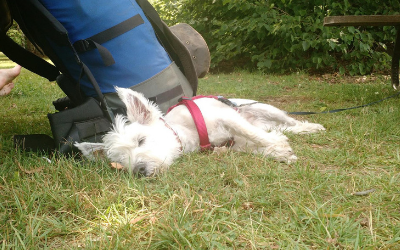
Nothing says summer like a family camping trip! The great outdoors, campfires, s’mores, and starlit skies! As National Camping Month comes to a close, why not plan a camping trip that includes your dog! Camping with Fido can be great fun, but you may want to consider a few things before heading out.
- Check to be sure that the park you’ve booked allows dogs. Not all parks do, and some have restrictions allowing dogs only in certain areas.
- For backcountry camping, keep in mind that some state parks allow dogs, while others don’t. Be sure to check the park’s website or call for confirmation.
- Let your dog check out your camping gear and watch you set up your tent before heading out! Have a “practice run” with your dog camping in your yard. Use a flashlight or headlamp on a nighttime walk so your dog gets used to it. Make sure to give your dog lots of treats and rewards during this training.
- Make sure to add your dog’s necessities to your camp check-list – food, water, dishes, medications, supplements and treats, a collar or harness and a leash (and a spare, just in case); your dog’s bedding, a couple of towels, a comb/brush, a personal flotation device (if canoeing or boating), some first aid supplies, a light-up collar, and don’t forget the waste bags!
- Be sure that your dog’s vaccinations are up to date and that he’s on flea and tick preventives – your dog is quite likely to encounter ticks while in the woods!
- Plan activities that you can do with your dog. Hiking is a great option but consider the difficulty of the trail and the ability (and experience) of your dog. Stay away from rocky paths, steep drops, or areas that allow mountain bikes. Build up stamina and toughen paws before you leave for your trip.
- When out on the trail, keep your dog leashed ( on a leash not exceeding 6 feet in length), and when at your campsite, keep your dog on a long line.
- Some parks have designated beach and exercise areas for dogs. Park staff can direct you to these areas.
- Some trails may be dog-free in order to preserve fragile ecological features – check with the park warden to be sure you understand the boundaries.
- Don’t plan on leaving your dog alone at your campsite if you head out for a day hike. It is potentially disruptive for other campers and could pose a danger to your dog if any wildlife were to wander through your camp.
- Be mindful of wildlife and other park-goers, whether at your camp or on the trail.
- Remove your dog’s waste and dispose of it properly.
Camping is a fun family adventure. With a little planning, you can make great memories that include your dog!